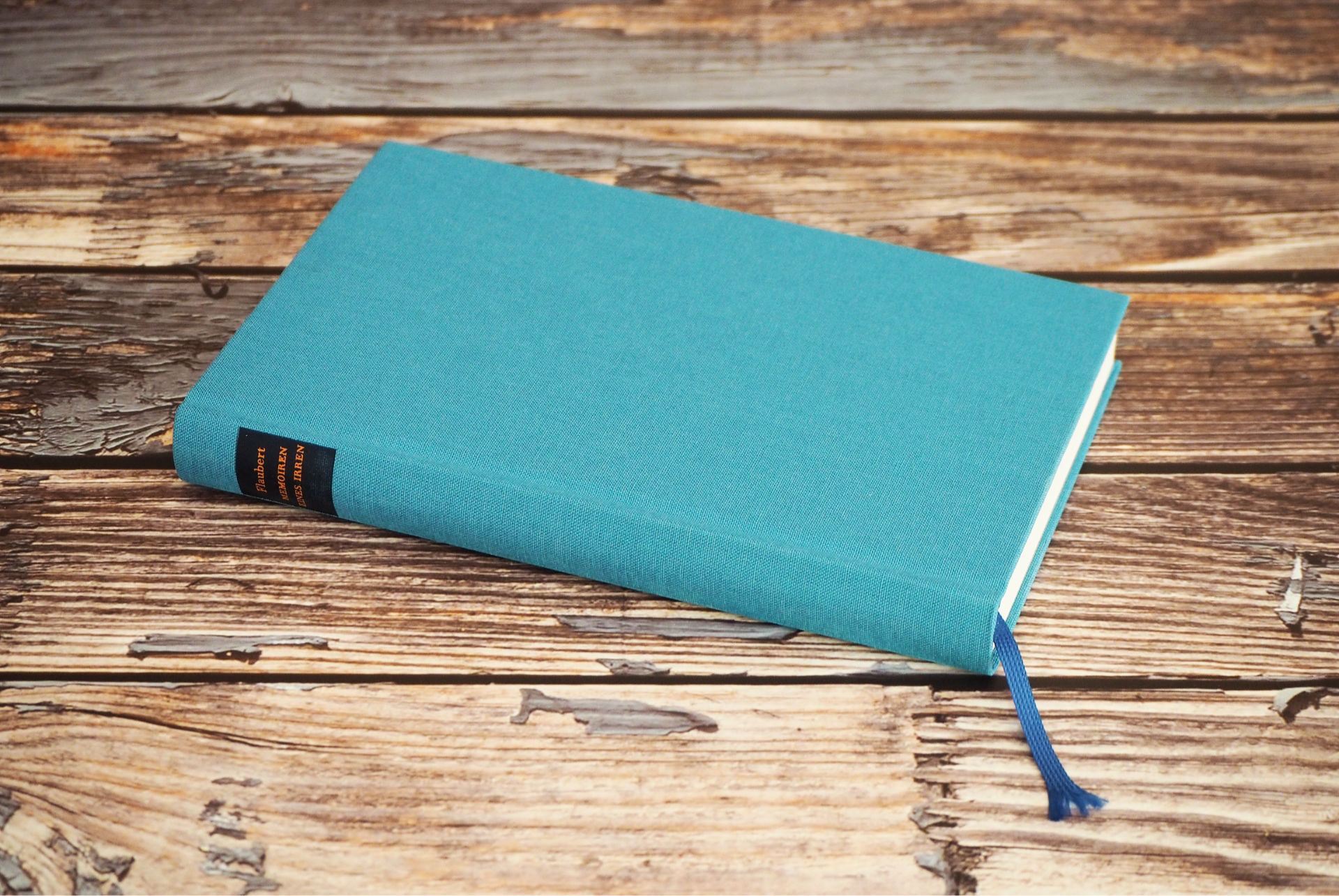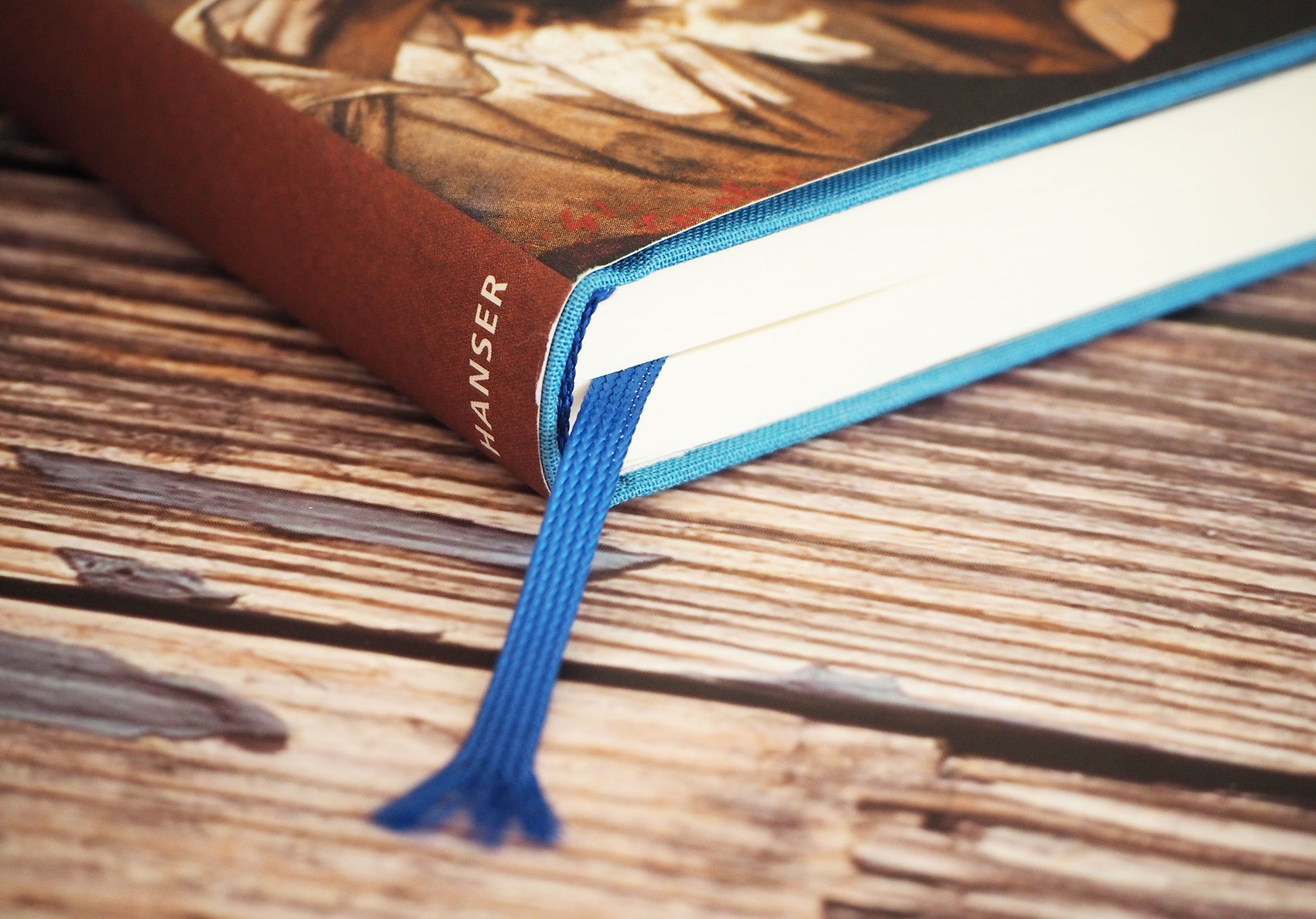Memoirs of a Madman • Gustave Flaubert

With Madame Bovary, Gustave Flaubert created a literary masterpiece that I have devoured and enjoyed several times. The book is widely known and remains very popular today—and rightly so, because the novel is fascinating in every respect: in its style, its wonderful sentences, and, of course, its protagonist. I read Madame Bovary in the excellent translation by Elisabeth Edl, who has since gone on to translate several more of Flaubert’s works into German. After spending so many delightful hours with Emma, it was clear to me that I wanted to own each of them. A few weeks ago, a new translation was released again: Memoirs of a Madman, a story Flaubert wrote at the young age of just sixteen. What awaits the reader and whether it’s worth reading, you’ll find out in this post.
A young man spends his vacation at a seaside resort, where he meets a woman he immediately falls in love with. Unfortunately, she is ten years older and married—though that does little to dampen his passion. In this early story, Flaubert processes an encounter that seemingly happened to him in real life, one that profoundly influenced him as a person and, even more, his literary work.
I admit, I only skimmed the blurb—actually, I read just this part: “A young boy among the summer guests in Trouville observes a woman who fascinates him. When he rescues her dressing gown from the tide and returns it, he falls in love instantly. Maria, however, is ten years older than he is…”. Anyone who has read Madame Bovary knows that’s more than enough to make you want to read the book. Flaubert was a French author of the 19th century, so it’s clear that things will get quite intense. Men weep, throw themselves at women’s feet, and passions overflow. Indeed, that’s very much the case here. From the very first page, Flaubert turns up the emotional intensity. You can count on the French for that—and as a dry, prosaic, rational German, it’s always a pleasure for me to read.

However, the book ultimately left me a bit disappointed. Of course, it would be unrealistic to expect another novel of the same caliber as Madame Bovary. The story is rather short, barely 95 pages, with the remainder of the volume filled with letters Flaubert wrote between 1830 and 1852. These letters help make both his creative process and his personality a bit more tangible. Accordingly, the story itself feels rather slight in terms of plot—there isn’t much that happens. I had hoped for passionate encounters, emotional turmoil, and feverish infatuation ending in scandal. Unfortunately, there’s little of that here; instead, Flaubert focuses on introspection, describing his own emotions. These are, of course, fiery, and the young Flaubert already shines with beautiful sentences and a deeply disillusioned, misanthropic tone that’s delightful to read. One can clearly sense, both in the language and the themes, the early flickers of Madame Bovary. For instance, when he describes how, during his college years, he had already given himself over to romantic literature and how novels like The Sorrows of Young Werther moved him emotionally. It’s quite reminiscent of Emma: “So she let herself be carried away by the meanderings of Lamartine, listening to the harps on the lakes, to the songs of dying swans, to the falling leaves, to the pure maidens ascending to heaven, and to the voice of the Eternal resounding through the valleys.” (Madame Bovary).
In addition to the short story, the book contains numerous letters that Flaubert wrote to close friends, above all his friend Ernest Chevalier. I found the letters quite entertaining, and together with the excellent notes, they provide a vivid glimpse into Flaubert’s artistic development as well as his personal relationships. After all, he was in good company, socializing with George Sand (with whom Balzac also corresponded extensively) and even meeting Victor Hugo.

Furthermore, the book includes an extensive afterword on Flaubert by Wolfgang Matz, the book’s editor. I had already read his The Art of Adultery, in which he analyzes and insightfully explains the great novels about adulterous women. I enjoyed the afterword—it also provides a good overview of Flaubert’s artistic evolution. Matz notes that Flaubert was one of the first writers to shape his stories through style rather than plot, and that this was precisely what he aimed for. Readers learn how Flaubert, beginning with Memoirs of a Madman, repeatedly explored the theme of infatuation with a married woman, developing it throughout his later works. However, the afterword also suffers from the typical overanalysis that intellectuals often fall into after dwelling too long on a topic. Flaubert’s first story was the product of a beautiful woman who left him dazzled. Even in his letters, I don’t see a genius so much as someone who loved to write, perfected his craft, and delighted in sensuality. Flaubert’s novels are wonderful, but to me, he’s no Balzac or Dumas. While he is often called the founder of the modern novel, that doesn’t particularly resonate with me—after all, I’m still happily stuck in the 19th century when it comes to literature.

The book itself once again impresses with the excellent production quality typical of the Hanser Classics series. The fine typography alone now evokes memories of so many wonderful novels I’ve read that it feels like balm for the soul. Elisabeth Edl’s notes are, as always, highly insightful, and it’s a pleasure to read them and learn more about Flaubert and the background of the story. As a whole, the book leaves nothing to be desired, and I never tire of praising the Hanser Classics for that.
Conclusion: Flaubert’s first short novel entertained me but didn’t entirely captivate me. The language is beautiful, passionate, and typical of the emotional French authors of his era. The story itself, however, feels rather shallow—and just as it begins to pick up, it’s already over. The letters and afterword are informative, offering a strong insight into Flaubert’s development as a writer and a fragmented glimpse into his life. The edition itself features the usual superb design that defines the Hanser Classics series, which I deeply appreciate. Overall, it’s an enjoyable but brief read that will appeal mainly to Flaubert enthusiasts. Those new to Flaubert should definitely start with Madame Bovary. If you’ve already read his A Sentimental Education and still can’t get enough of Flaubert, this book is highly recommended. And if, like me, you own all of Elisabeth Edl’s new Flaubert translations, you should absolutely get Memoirs of a Madman—it’s a perfect addition to the collection.
Book Information: Memoirs of a Madman • Gustave Flaubert • Hanser Verlag • 240 pages • ISBN 9783446268456

Da ich Zeit meines Lebens Flaubert für einen der Größten halte, alle seine Romane gelesen habe,auch seine Bruefwechsrl mit den Brüdern Goncourt, mit Turgenjew, mit George Sand und Maupassant, finde ich, dass manches, das Sie über Flaubert schreiben, ihm nicht gerecht wird. Flaubert ist zu allererst ein Künstler, das heißt , ihm geht es nicht um Plots und Unterhaltung etc. und man kann ihn sowohl künstlerisch als auch historisch nicht Balzac gegenüberstellen, selbst wenn wir die Romane Balzacs verschlingen sollten. Flaubert macht Musik, er malt, Rhythmus und Form spielen bei ihm eine Hauptrolle.
MADAME BOVARY ist zum Beispiel ein Roman , dessen Thema Flaubert als einen Dreckklumpen bezeichnet, den er durchkneten und formen musste, damit er zu dem Meisterwerk wurde, das jeder als ein solches erkennen muss, wenn er einen Sinn für Literatur und Kunst besitzt. Dass dann auch INHALTLICH eine so radikale wie sensible Geschichte daraus hervorgeht, liegt gerade daran, dass er diesen „Dreckklumpen“, diese miese Provinzgeschichte, der anders als den exotischen Stoffen anderer Texte Flauberts nichts Verlockendes anhaftete, zu einem Kunstwerk formte, in einen Goldklumpen verwandelte durch die Technik mitleidsloser Beschreibung, so dass als unerwartete Folge hier auf eine unvergleichbare Weise das Scheitern einer Frau zur gesellschaftlichen Anklage wird.
Die auch von Elisabeth Edl neu übersetzte EDUCATION SENTIMENTALE ist auch ein großartiges Werk , das bis heute oder gerade in unseren Tagen an Aktualität gewinnt.
Um vielleicht Flauberts künstlerische Intention zu verdeutlichen, sei auf eine Bemerkung von ihm in einem seiner Briefe verwiesen, wo er sagt, dass er am liebsten ein Buch „über nichts“ schreiben würde , was natürlich nicht geht, da das Material Sprache immer mit Bedeutungen verknüpft ist.
Lieber Michael,
vielen lieben Dank für Deinen Kommentar und Einschätzung, die zu lesen sehr interessant ist und die mir auch sehr gut widerspiegelt, wie meine Buchbesprechung wirkt.
Gerade der geschliffene Stil Flauberts wird ja allgemein gelobt und ich glaube selbst jemand, der ohne Kontext einfach zu Madame Bovary greift und nur ein mäßiges Gespür für Literatur hat, kann sehr leicht Gefallen an diesen schönen Sätzen finden. Mein Vergleich mit Balzac ist auf jeden Fall eine sehr persönliche Einschätzung, auch wenn ich das nochmal deutlicher hätte schreiben können. An Flauberts Kunstfertigkeit kann man nun wirklich nicht zweifeln und ich habe jeden seiner Romane genossen und ohne Zweifel gehört er zu den ganz ganz dicken Fischen im Teich. Dein Vergleich er macht “Musik” finde ich sehr gelungen, das trifft es sehr gut. Für mich ist Balzac hingegen der große Meister, seine Romane haben mich berührt und ich habe so viele davon verschlungen, dass da auch Flaubert nicht im Ansatz ran kommt. Einen Vergleich zwischen Balzac und Flaubert könnte man auf viele Arten angehen, was wohl aber nur im literaturwissenschaftlichen Sinn von Bedeutung ist. Meine Perspektive ist die eines Lesers, der hochwertige Kost möchte, aber auch Unterhaltung sucht. Was Unterhaltung angeht ist “Madame Bovary” ein Knaller, “Memoiren eines Irren” hingegen nicht. Wobei die Briefe und das ausführliche Nachwort genau das schön darstellen, was Du schreibst: Flaubert ging es ganz stark um den Stil und nachrangig um die Story. Der Brief, wo er schreibt, er würde gerne über nichts schreiben ist auch enthalten, was sehr für die sorgfältige Zusammenstellung dieses Buches spricht. Daher auch meine abschließende Einschätzung: Wer in den vollen Genuss Flauberts kommen will, sollte erst seine beiden großen Romane lesen und dann zum Ausklang zu diesem Buch greifen.
Liebe Grüße und herzlichen Dank für Deine wertvolle Anmerkung!
Tobi
Ach, ich mag solche Geschichten. Wer kennt´s nicht? Da läufst du deine Runde am Meer, siehst ne Frau – schöner als jede andere – und kriegst sie ne Zeit lang nicht mehr aus dem Kopf. Doch, das Buch werde ich kaufen und mit Vergnügen lesen. Ein Hoch auf die Frauen! :-))
Als begeisterter Leser von Madame Bovary und Lehrjahre der Männlichkeit waren die Memoiren eines Irren für mich persönlich eine Enttäuschung. Nicht umsonst hielt Flaubert diesen “Roman” zu Lebzeiten unter Verschluss. Ich verstehe hier auch das Vorgehen des Hanser Verlages nicht, in Kombination mit Novembre und der ersten Fassung der Education sentimentale wäre das sicherlich interessant gewesen, als Einzelveröffentlichung kann ich dieser Fingerübung leider nichts abgewinnen. Einzig das gelungene Nachwort von Wolfgang Matz und die Briefe rechtfertigen den Kauf des Buches. Ich stimme dir also zu, zuerst sollte man die oben genannten Romane lesen und wenn die einschlagen, könnte man sich an die Memoiren heranwagen.